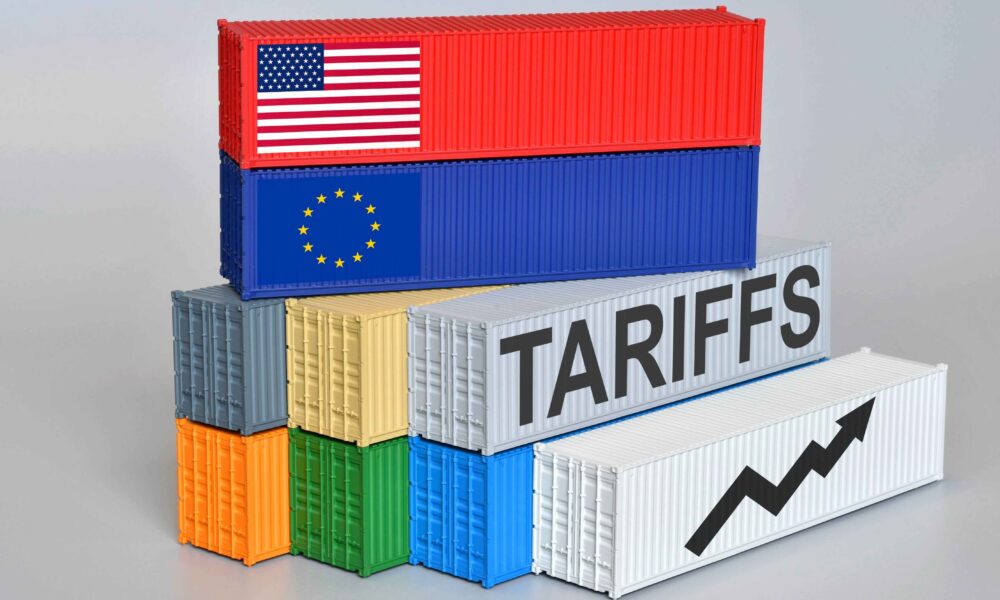Donald Trump’s import levies have caused widespread uncertainty and disruption to the markets. How will the events industry be impacted?
Last week, President Trump imposed tariffs on imports from nearly 100 countries. The immediate consequence has been a sharp decline in market performance and a rise in the cost of goods – not just for Americans, but for consumers around the world. As the cost of doing business and exporting to the United States increases, the ripple effects are being felt far beyond its borders.

What do Trump’s tariffs mean for the events industry?
While the direct impact on events may not be immediately apparent, the interconnected nature of global trade means that increased costs in related industries can cascade into the events sector.
Increased Operational Costs
Tariffs on goods such as steel and aluminium have led to increased costs for UK manufacturers. These materials are essential in events, for building stages, booths, and seating arrangements. Consequently, event organisers may face higher expenses when sourcing these materials, potentially leading to increased overall event costs.
Impact on Exhibitors and Participants
The broader economic impact of tariffs includes potential reductions in international trade and economic growth. This economic uncertainty can affect companies’ marketing budgets, leading to decreased participation in events and exhibitions. Smaller businesses, in particular, may find it challenging to absorb these additional costs, resulting in reduced presence at industry events.
Potential Decline in International Attendance
The tourism sector, which significantly overlaps with the events industry, may also be affected. Economic strains from tariffs could lead to decreased international travel, impacting attendance at UK events. Visit Britain’s forecast for 2025 anticipated growth in overseas visits; however, the current trade tensions introduce uncertainty into these projections.
How Can Event Planners Mitigate These Effects?
As global trade tensions rise and costs increase, event planners need to be more agile than ever. Here’s how you can stay ahead:
1. Embrace Hybrid and Virtual Formats
With international travel becoming more expensive and uncertain, more attendees are likely to reduce long-haul travel. This makes hybrid and virtual infrastructures critical.
Hybrid events were already a growing trend – a 2024 AMEX Global Meetings and Events Forecast found that 71% of planners expected hybrid to be a standard part of their strategies. Tariffs and economic pressure are likely to accelerate this shift even further.
For your event, consider partnering with an events agency experienced across all event formats, and who can adapt quickly to changing circumstances, ensuring seamless in-person and digital experiences.

2. Prioritise Local Sourcing
To avoid the higher costs associated with imported goods and services, planners should look to source materials, suppliers, and talent locally wherever possible.
Working with agencies that have deep networks within their operating countries will help you secure high-quality suppliers without excessive shipping costs or import duties. This also supports local economies and demonstrates alignment with ESG, which can be a valuable message to share with your audiences.
3. Rethink Venue Choices
With travel costs rising, regional hubs and second-tier cities might become more attractive than traditional major city venues. These locations often offer lower costs for accommodation and facilities and may be more accessible for local and regional audiences.
A Skift report on event trends notes that mid-size cities have been investing heavily in upgraded infrastructure, anticipating a shift in demand.
4. Focus on Sustainability and Efficiency
Supply chain disruptions and higher prices make efficiency more important than ever. Sustainable event practices – like minimal shipping, reusable set designs, and digital-first communication – not only align with audience expectations but can also drive significant cost savings.
Reports show that sustainability is a core expectation for event agencies and delegates, Event organisers must now be prepared to elevate it even higher on the agenda.
5. Build Flexibility Into Contracts
Given the current economic uncertainty, it’s vital to work flexibility into vendor, venue, and speaker contracts.
Force majeure clauses, flexible cancellation terms, and clear contingency plans can help protect your event if circumstances change suddenly due to tariff adjustments, supply shortages, or broader economic shifts.
Why the UK and Singapore Remain Strategic Event Hubs
Both the UK and Singapore have, so far, been relatively insulated compared to other regions. While many countries have faced tariffs of 25% or higher, goods from the UK and Singapore have seen comparatively lower tariffs of around 10%. This softer impact provides some breathing room for event planners operating in or sourcing from these markets. It also makes these regions more attractive as event hubs or sourcing bases for organisers looking to manage costs without compromising on quality.
Download our latest report to explore the latest event solutions, learn how event production agencies are leveraging technology for seamless conference planning, and uncover strategies to enhance hybrid event management.






